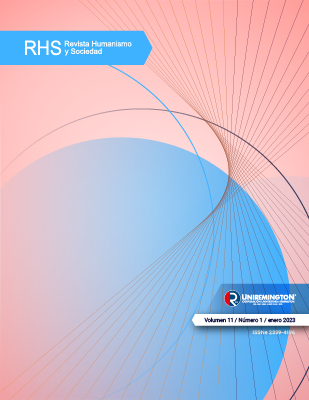Cognition and Memory in the Withdrawal of the Self Reflection from Paul Ricoeur
Main Article Content
Abstract
The objective of this article is to present an analysis of memory and its place in the configuration of personal identity. It is argued that personal identity implies the construction of a reflexive memory, and that cognition connects with Paul Ricoeur’s phenomenological hermeneutics in the work of recollection that turns the self into an object of memory.
Downloads
Article Details

This work is licensed under a Creative Commons Attribution-NonCommercial-ShareAlike 4.0 International License.
Those authors who publish with this journal agree to the following terms:
The designated authors will retain copyright of all papers and grant the journal the right of first publication of their work, which will be simultaneously published under the Creative Commons Attribution License that allows third parties to share the work, as long as its author is attributed and this journal is identified as the original publisher.
Authors may enter into separate, additional non-exclusive licensing agreements for the distribution of the published work (e.g., post it to an institutional telematic archive or publish it in a monographic volume) as long as this journal is acknowledged as the original publisher.
References
Aristóteles (2010). Acerca del alma. Gredos.
Aristóteles (1995). Física. Gredos.
Aristóteles (1987). Acerca de la Generación y la Corrupción. Tratados Breves de Historia Natural. Gredos.
Agustín de Hipona. (2010). Confesiones. Gredos.
Asor, A. (2005). El alba de un nuevo mundo. Ediciones Barataria.
Cambiano, G. (2007). Problemi della memoria in Platone. Maria Michela Sassi (ed.). Tracce nella mente. Teorie della memoria da Platone ai moderni. Edizione della Normale.
Contreras Tasso, B. E. C. (2019). La mémoire inquiétée: La capacité de la mémoire face aux dilemmes de l’agir humain juste et accueillant. Études Ricœuriennes/Ricœur Studies, 10(1), 26-42. https://doi.org/10.5195/errs.2019.467 DOI: https://doi.org/10.5195/errs.2019.467
Crespo, E. (1995). Introducción a la Psicología Social. Editorial Universitaria S. A.
Díez Fischer, F. (2018). El tiempo según Paul Ricoeur. Escritos, 26(57), 283-318. http://doi.org/10.18566/escr.v26n57.a03 DOI: https://doi.org/10.18566/escr.v26n57.a03
Fuenmayor, J. F. (2016). La muerte en la calle y otros cuentos. Universidad del Norte Editorial.
Gilardi, P. (2011). La reconfiguración del tiempo en la narración historiográfica según Paul Ricoeur. Estudios de historia moderna y contemporánea de México, (41), 103-115. https://doi.org/10.22201/iih.24485004e.2011.41.26586 DOI: https://doi.org/10.22201/iih.24485004e.2011.41.26586
Gómez, L. (2011). Un espacio para la investigación documental. Revista Vanguardia psicológica, 2, 226-233. https://dialnet.unirioja.es/descarga/articulo/4815129.pdf
Kawabata, Y. (2009) Lo bello y lo triste. Emecé.
Lariguet, G. (2015) La investigación filosófica: ¿análisis conceptual versus análisis histórico? Praxis filosófica, 42, 219-244. https://doi.org/10.25100/pfilosofica.v0i42.3174 DOI: https://doi.org/10.25100/pfilosofica.v0i42.3174
Ledesma, F. (2016). Amor, lenguaje y olvido. Sobre memoria y desmemoria en los diálogos de Platón. Logos: Análisis del Seminario de Metafísica, 49, 91-109. https://doi.org/10.5209/rev_ASEM.2016.v49.53174 DOI: https://doi.org/10.5209/rev_ASEM.2016.v49.53174
Ovejero, A. (2007). Las relaciones humanas. Psicología social teórica y aplicada. Editorial Biblioteca Nueva.
Platón. (1988). “Teeteto”. En Diálogos V (pp. 137-317). Traducción, introducción y notas de Isabel Santa Cruz, Álvaro Vallejo Campos y Néstor Luis Cordero. Gredos.
Quiceno Osorio, J. D. (2019). Memoria y mismidad. Análisis desde la fenomenología-hermenéutica de Paul Ricœur. Humanidades: revista de la Universidad de Montevideo, (5), 81-109. https://doi.org/10.25185/5.4 DOI: https://doi.org/10.25185/5.4
Real Academia Española. (s.f.). Artificioso. En Diccionario de la lengua española. Recuperado en 01 de junio de 2022, de https://dle.rae.es/artificioso?m=form
Ricœur, P. (2000). La mémoire, l’histoire et l’oubli. Éditions du Seuil.
Ricœur, P. (2010). La memoria, la historia y el olvido (2.ª ed.). Editorial Trotta.
Ricœur, P. (2013). Sí mismo como otro. Siglo XXI editores.
